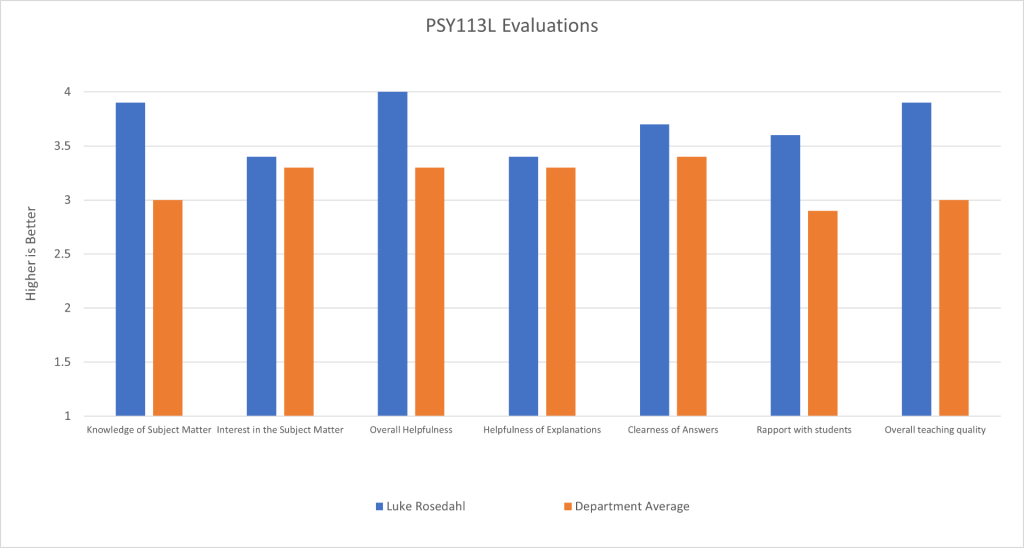My love of exploring, learning, and sharing led me to community college my junior year of high school, where I discovered a new way to share: tutoring. I taught everything from elementary algebra to students completing their GEDs to differential equations to working professionals; every student was at a different point in their academic journey and had their own struggles. Interacting with these students provided the framework for my teaching philosophy: meet your students where they are. I implement this philosophy by asking two questions: What do they know? and What do they care about?
What do they know? Midway through a lecture on computational models of category learning, I noticed the incoming freshmen in my Summer Institute of Math and Sciences group were looking lost, so I asked if there were any questions. To which one of my students replied, “What is a neuron?”
After pivoting to a brief description of basic neuroscience my students ultimately went on to understand and implement computational models, but this experience taught me the essentialness of not assuming the knowledge levels of my students. Before they can understand computational models of neurons, they must know what a neuron is. How can we as teachers know when students are ready for threshold concepts if we don’t know where they are at in their journey? Especially when teaching courses that include a diverse population of students from non-traditional backgrounds, determining what background knowledge the students have is essential. I now use pre-course background knowledge exams and formative “check-in” quizzes to ensure the material is appropriate for where my students are.
What do they care about? I was struggling to keep the students in my Complex Systems in Brain Sciences section engaged. We were discussing complex networks and the classic example of airline routes just wasn’t clicking. Re-analyzing the scaffolding of the example, I had the students imagine themselves as a node, each friendship within the class as an edge, and their small work groups as cliques. Suddenly, the previously abstract concepts were tied to real, socially relevant properties which the students found interesting and intuitive.
Using examples that are relevant to the students is just one tactic to focus on what the students care about. Showing my enthusiasm for the material, using projects to facilitate problem-based learning, situating new concepts in regards to what they already know, and giving students freedom to explore topics they find interesting are some of the many ways I ask the question “What do they care about” as I seek to motivate my students and pique their intellectual curiosity.
By asking “What do they know?” and “What do they care about?” while designing course material, I work to ensure my teaching is as engaging and interesting as possible. Combined with the structural components of a course (such as providing proper organization, clear expectations and learning objectives, and allowing students flexibility to pursue individual learning tracks), my philosophy of meeting my students where they are guides me on my journey to continually improve as a teacher.
Teaching Experience
Instructor of Record: PSY130 Perception: Vision, Psychological and Brain Sciences Santa Barbara, CA. Summer 2021
Instructor of Record: PSY123 Cognitive Neuroscience, Psychological and Brain Sciences Santa Barbara, CA. Summer 2021
Teaching Assistant: PSY113L Complex Systems in Brain Science, Psychological and Brain Sciences Santa Barbara, CA. Winter 2020
Research Instructor: Summer Institute in Mathematics and Science,Santa Barbara, CA. August 2017
Research Instructor: Condor Techs, Santa Barbara, CA. August 2016
Research Instructor: Summer Institute in Mathematics and Science, Santa Barbara, CA. August 2016
Instructional Development Experience
Instructional Design Assistant, UCSB Letters and Sciences IT, Santa Barbara, CA. 2020-2021
Remote Instructional Development Teaching Assistant, Psychological and Brain Sciences Santa Barbara, CA. 2020- 2021
Certifications
Certificate in Pillars of Teaching Assistantship, Santa Barbara, CA. Spring 2020
Teaching Evaluations
“Despite the course being really new, Luke would always know how to answer my questions during section. He also knew how to make the hard topics seem a little easier, especially since I didn’t have a lot of experience in coding. I really enjoyed his section a lot!” – Comment on my PSY 113L Evaluations
PSY113L: Complex Systems in Brain Science, Psychological and Brain Sciences Santa Barbara, CA. Winter 2020

Stay tuned for Summer 2021 evaluations!
Mentorship
Mentoring Research Assistants was one of the most rewarding parts of my graduate career. I loved watching my RAs develop as researchers, scientists, and people and am honored to be part of their stories. Below are some of my current and former Undergraduate Research Assistants:
Vera Poyraz. 2021 –
Vera works on a variety of projects including the role of feature based attention in category learning induced transfer of VPL.
Andrew Kim. 2021 –
Andrew works on python implementations of computational models of category learning.
Cody Hubbard. Summer 2022
Cody was a visiting summer research intern from Emory & Henry College. He worked on a project examining the effect of water reward on category learning.
Erin Kim. 2018 – 2020
Erin did her Honor’s Thesis on Working Memory Load during Explicit Category Learning (for which she got a URCA research grant!).
Raina Serota. 2019 – 2020
Raina worked on a project examining the role of instructions in category learning and is a co-author of Rosedahl, Serota, and Ashby (In Press).
Albert Yang. 2019 – 2020
Albert worked on modeling late-stage category learning and creating category-learning experiments to run online.
Thalie Timsit. 2016 – 2019
Sharon Su. 2017-2018
Sharon worked as a Research Professional at Stanford and is currently a Neurobiology and Behavior PhD student at Columbia University.
Matt Swiacki. 2016 – 2018.
Matt is now a Sr. Account Manager at Rakuten Advertising.
Brooke Renard. 2017 – 2018.
Brooke is currently a medical student at California University of Science and Medicine.
Erica Carnohan. 2016.
